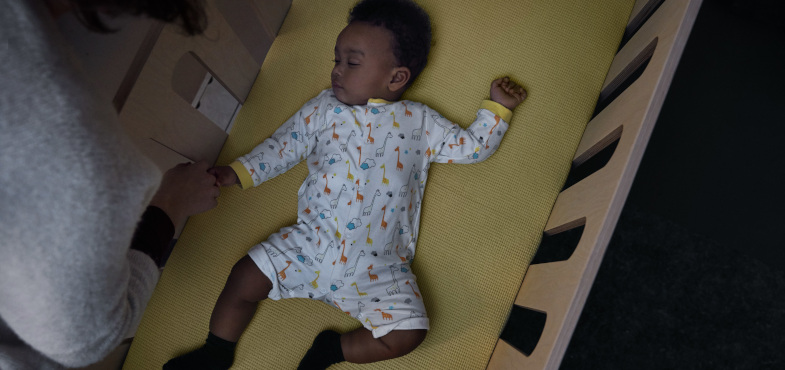A Guide to Babies’ Sleeping Patterns

Everyone loves a good night’s sleep. Though you may not be getting much in the early days of being a parent, it’s important that your baby does. Sleep is vital for their growth and development, both mentally and physically, and it’s during their times of rest that most of this takes place.
For the majority of their first few months, your baby will spend nearly all of the time they’re not eating asleep and because of this, their sleeping patterns might be a bit out of sync with what you’re used to.
It’s no secret that getting into a bedtime routine is one of the most difficult parts of being a new parent, particularly because sleep patterns differ from baby to baby, so there’s no hard and fast rule. Your little one’s sleep-wake cycle is something you’ll soon become accustomed to as parents, however, and it should start to become more regular and predictable as the weeks go by.
Many parents have questions when it comes to understanding their baby’s sleep patterns, so we’ve put together this handy guide to help you learn the basics and give you the best chance of getting some well-deserved shut eye.
Why do babies sleep so much?
As most parents will know, babies spend a lot of time asleep – most of their time in fact. During these first few months, your little one is undergoing a lot of change – growing and developing both mentally and physically. Good sleep is vital at this stage of their growth. It’s when much of the change happens, as key hormones are released during deeper sleep stages that form the building blocks of your baby’s development.
Though it differs from child to child, most newborns will sleep for as many as 18 hours a day1 – typically waking only when they’re hungry. Babies are used to sleeping a lot of the time – after all, they’ve just spent the past nine months in a sleep-like state in the womb.
How much sleep does a baby need?
A newborn can sleep for as much as 18 hours a day, but this will slowly start to reduce as your baby grows and becomes more aware of their surroundings.
As most parents discover, it’s not the amount of sleep that causes issues with a new baby, but more the broken nature of their rest. Babies will typically sleep in short bursts2, napping for between three to four hours at a time and waking when they’re hungry. Their small stomach and need for nutrition means they can only hold a certain amount of food, so need regular feeding throughout the day and night.
Your baby most likely won’t sleep through the whole night until they are around three months old, but this will differ from baby to baby. So, while there are some who will sleep for longer periods straight away, there are others who will take some months to settle into a more regular schedule.
The good news is, as they grow older, your baby’s sleep pattern will begin to even out and they’ll require less shut eye by the month. As the weeks go by, their sleep schedule may even begin to resemble something like your own, letting you settle back into your own routine a little more easily.
As babies grow they’ll need:
1-3 months – A newborn will sleep for around 18 hours a day, typically in short bursts, waking only when they’re hungry or require changing.
3-6 months – A six-month old will sleep for around 15hrs a day, with short naps during the day and a longer stint at night – this change happens as they begin to recognise darkness as a time for resting.
6-12 months – A baby’s sleep schedule will begin to resemble your own. They may still have a short nap or two during the day, but they’ll mostly be set to sleep for the full evening – waking only once or twice.
12 months+ - At this stage, a baby should be more comfortable sleeping the full night through. Though most may still wake during the night to be fed, they’ll typically be happy with sleeping for the usual eight hours a night.
When do babies sleep through the night?
As your baby grows, they become more accustomed to sleeping for longer periods. By the one-year mark, they should be happy with sleeping the whole night through, only occasionally waking through the night. Though most will still awaken now and again, your little bundle of joy will have a sleep pattern that more than likely matches yours, or at least what it used to be.
How often do you make sure your baby gets enough sleep?
As your baby grows, getting them used to a regular sleep schedule is an important part of their development process. After a few months, they’ll naturally be able to tell night from day and recognise darkness as a time for rest.
At first, your baby will sleep for much of the day, waking only when they’re hungry. However, as they grow, they will become more comfortable with sleeping for longer periods. Plus, their larger stomachs will be able to hold more food – reducing the need to feed every few hours.
Around the six-month mark, you should begin to start instilling a regular bed time pattern into your child’s schedule. Putting your baby down to sleep in the early evening will get them used to associating this time with rest – don’t worry if they don’t settle straight away, getting your baby to sleep in a cot can be a slow process.
Babies sleep a lot and getting accustomed to your little one’s sleep patterns is a great way to ensure they’re getting the right amount of rest for all the development that takes place during these important early months.
Discover more top tips and helpful hints to guide you through your baby’s early stages with JOHNSON’S® Baby.
2 https://www.nct.org.uk/baby-toddler/sleep/newborns-and-sleep-routines-and-patterns-0-3-months
JOHNSON'S®Pioneering Safety and Science in Baby Care
We are committed to working with Parents, Healthcare Professionals and Scientists to ensure our baby products continue to deliver high standards of safety and care.
